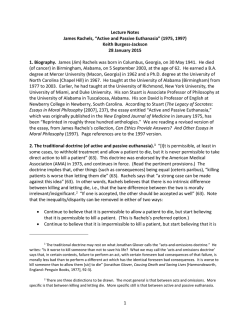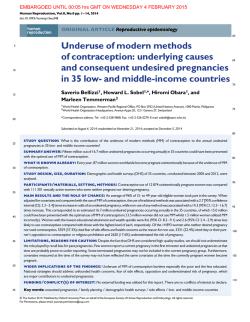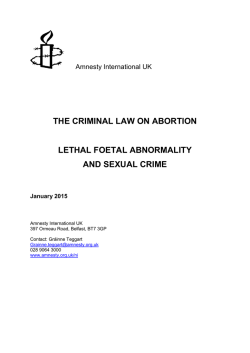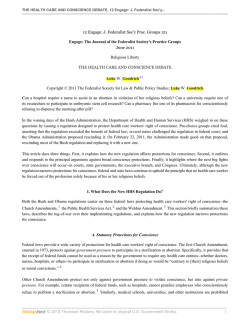
Killing, Abortion, and Contraception: A Reply to Marquis
Journal of Philosophy, Inc. Killing, Abortion, and Contraception: A Reply to Marquis Author(s): Alastair Norcross Source: The Journal of Philosophy, Vol. 87, No. 5 (May, 1990), pp. 268-277 Published by: Journal of Philosophy, Inc. Stable URL: http://www.jstor.org/stable/2026835 . Accessed: 30/01/2015 20:05 Your use of the JSTOR archive indicates your acceptance of the Terms & Conditions of Use, available at . http://www.jstor.org/page/info/about/policies/terms.jsp . JSTOR is a not-for-profit service that helps scholars, researchers, and students discover, use, and build upon a wide range of content in a trusted digital archive. We use information technology and tools to increase productivity and facilitate new forms of scholarship. For more information about JSTOR, please contact [email protected]. . Journal of Philosophy, Inc. is collaborating with JSTOR to digitize, preserve and extend access to The Journal of Philosophy. http://www.jstor.org This content downloaded from 137.205.50.42 on Fri, 30 Jan 2015 20:05:39 PM All use subject to JSTOR Terms and Conditions 268 THE JOURNAL OF PHILOSOPHY of which it can be deprived. A living human cell that might be stimulated to develop into a clone of a person does not now have a personal future. A fetus similarly has only the potentiality to develop a personal future. For this reason, killing a fetus is morally very different from killing a normal adult human. PETER K. MCINERNEY Oberlin College KILLING, ABORTION, AND CONTRACEPTION: A REPLY TO MARQUIS* Don Marquis, in "Why Abortion is Immoral,"' argues that "abortion is, except possibly in rare cases, seriously immoral, that it is in the same moral category as killing an innocent human being" (183). His argument for this is that abortions share with killings the central feature that makes them wrong. "Killing someone is wrong, primarily because the killing inflicts (one of) the greatest possible losses on the victim . . . the loss . . . of all those activities, projects, experi- ences, and enjoyment which would otherwise have constituted [the victim's] future personal life" (189). Marquis argues that, since fetuses have futures that include a set of "experiences, projects, activities and such which are identical with the futures of adult human beings," it follows that abortion is "prima facie seriously morally wrong" (192). Marquis answers several possible objections to his account. In this paper, I shall discuss the one objection to which his answer is clearly inadequate. I shall claim not only that his answer is inadequate, but that an adequate answer is not available to him, and thus that his account fails to support the claim that the overwhelming majority of abortions are seriously immoral. I Marquis admits that, if his account of the wrongness of killing and of abortion entails that contraception is also seriously immoral, "then there would appear to be a difficulty with the analysis of [the] essay" (201). He claims that his analysis would entail that contraception is wrong "only if something were denied a human future of value by contraception. Nothing at all is denied such a future by contraception, however" (201). Marquis considers and rejects four candidates * Thanks are due to Jonathan Bennett, Frances Howard, Joel Kidder, and Steven Lee for helpful comments on an earlier draft of this paper. 'Don Marquis, "Why Abortion is Immoral," this JOURNAL, LXXXVI, 4 (April 1989): 183-202. 0022-362X/90/8705/268-277 ?) 1990 The Journal of Philosophy, Inc. This content downloaded from 137.205.50.42 on Fri, 30 Jan 2015 20:05:39 PM All use subject to JSTOR Terms and Conditions KILLING, ABORTION, AND CONTRACEPTION 269 for the role of subject of harm by contraception: (1) some sperm or other, (2) some ovum or other, (3) a sperm and an ovum separately, (4) a sperm and an ovum together. I shall concentrate on his treatment of (4), since I think it is clearly the most promising candidate. Marquis offers the following argument in response to the suggestion that contraception deprives the combination of sperm and ovum of a valuable future-like-ours: At the time of contraception,there are hundredsof millionsof sperm, one (released)ovumand millionsof possiblecombinationsof all of these. There is no actualcombinationat all. Is the subjectof the loss to be a merelypossiblecombination?Whichone?Thisalternativedoes not yield an actualsubjectof harmeither. Accordingly,the immoralityof contraception is not entailedby the loss of a future-like-oursargumentsimply because there is no nonarbitrarilyidentifiablesubjectof the loss in the case of contraception(202). I do not think it is clear from this passage what Marquis is claiming. It is all we get by way of argument against candidate (4), however, so we will have to work with it. I take it that Marquis does not mean that we could never tell which combination of sperm and ovum is the subject of loss in the case of successful contraception. I do not see how such an epistemic difficulty could rescue contraception from the charge of wrongdoing that Marquis's account levels against abortion. Consider the following two scenarios: (i) London is struck by a series of freak accidents involving power plants, which result in the deaths of almost everyone within a twenty-mile radius of Whitehall. The Prime Minister, Mrs. Butcher, is informed that there are a handful of survivors. She orders the army to round up the survivors, make a record of their names, and kill them. (ii) In response to the same information as in the previous example, Mrs. Butcher orders a hydrogen bomb to be detonated in London, thereby eliminating the possibility of discovering who survived the initial accidents. I hope it is clear that at least part of what is morally wrong with Mrs. Butcher's actions in each case is that some people are killed who would otherwise have lived. It makes no difference that in case (ii) it is impossible to tell which people were killed by the nuclear explosion. It might be objected that contraception differs crucially from my example (ii) in that one cannot say of every use of contraception that it prevents conception. In most cases pregnancy would not have resulted anyway. One response to this would be to modify (ii) so that Mrs. Butcher is only told that there is a small but significant possibility that there are survivors. More importantly, though, I think it would be small comfort to the proponent of the moral acceptability of contraception to be told that contraception is morally permissible in all those cases in which it does not actually prevent conception. This content downloaded from 137.205.50.42 on Fri, 30 Jan 2015 20:05:39 PM All use subject to JSTOR Terms and Conditions 270 THE JOURNAL OF PHILOSOPHY The intuition that contraception is morally permissible is the intuition that it is permissible even, or perhaps especially, in those cases in which it fulfills its purpose. Perhaps Marquis is not simply making an epistemic claim when he says that there is no nonarbitrarily identifiable subject of loss in the case of contraception. When he says that there are millions of possible combinations of sperm and ovum, but no actual combination, perhaps he means that there is no fact of the matter as to which sperm, if any, would have fertilized the ovum. It may be that the behavior of sperm is not strictly deterministic. Does this distinguish contraception from abortion and killing? Consider the following scenario: two prisoners of conscience, Smith and Jones, are slated for execution in a small totalitarian republic. The president, Shrub, troubled by the effect of an Amnesty International campaign on his public image, decides to spare one of the prisoners. He cannot make up his mind whose life to spare, so he devises the following apparatus: Smith and Jones are placed in separate cells, each with air vents leading to a cannister of poison gas, which is set to release its contents at noon. A computer is programmed to select a three-digit number at random at one second before noon. If the number is even or zero, the computer will close the air vent in Smith's cell; if the number is odd, the computer will close the air vent in Jones's cell. The random-number selection process is truly indeterministic. The vice-president of the republic, Fowl, does not approve of Shrub bowing to liberal pressure. Fowl unplugs the computer at one minute before noon. The gas is released at noon, and both Smith and Jones die. I hope it is clear that Fowl has done something bad in this example. Two people have died instead of one. It is also clear that there is no fact of the matter as to which prisoner has been deprived of a valuable future by Fowl's actions. I do not think that the moral status of Fowl's action would change if the number of condemned prisoners was increased, but the number to be saved was kept at one. Even if Fowl's action makes it the case that a million and one die, instead of a million, he would have been responsible for the occurrence of one more death than would otherwise have occurred. In both of these cases, it seems that there is no nonarbitrarily identifiable subject of the loss of a valuable future. In both of these cases, Fowl's action is morally on a par with killing one person. Let us return to the two-person case. We might still want to say that Fowl has harmed both Smith and Jones. We might say that the harm consists in lowering, from fifty percent to zero, their chances of surviving. (Indeed, given uncertainty about the length and quality of anyone's life, we should probably give a similar account of the harm involved in killing anyone.) If we increase the numbers, we can still This content downloaded from 137.205.50.42 on Fri, 30 Jan 2015 20:05:39 PM All use subject to JSTOR Terms and Conditions KILLING, ABORTION, AND CONTRACEPTION 271 say that Fowl has harmed all the prisoners. In the case of a million and one prisoners, Fowl has reduced each of their chances of survival from just under one ten thousandth of one percent to zero. However we describe the immorality of Fowl's action, it is clear that what he does is wrong for precisely the same reason as a standard killing is wrong. Either Fowl harms all the prisoners, or the lack of a nonarbitrarily identifiable subject of loss does not provide a morally relevant distinction between this case and a standard case of killing. The similarities between contraception and the example discussed above are clear in terms of the loss of a valuable future. Either contraception harms all the combinations of sperm and ovum, or the lack of a nonarbitrarily identifiable subject of loss does not provide a morally relevant distinction between contraception and abortion. II It might be claimed that there is a significant difference between the case of contraception and my poison-gas examples. In the poison-gas example, all the candidates for subject of the loss of a valuable future were things, people, in fact. In the case of contraception, the candidates I have been considering-combinations of sperm and ovumare nonstarters, not because there is no nonarbitrarily identifiable subject of loss, but because a combination of sperm and ovum cannot be a subject of anything, because "it" is not a thing.2 I do not know whether Marquis would be prepared to make this claim, but it is worth considering on its own merits. It might be instructive at this point to consider what could be meant by 'a combination of sperm and ovum'. What has to be the case for such a thing to exist? It might be natural to assume that, for such a thing to exist, a sperm and an ovum would have to be combined. What would have to be the case for a sperm and ovum to be combined? Perhaps a sperm and an ovum would have had to have joined to form a zygote. Marquis might be taken to be espousing this reading of 'a combination of sperm and ovum' when he claims that there is no actual combination at the time of contraception. If this is his position, then he is, of course, right to say that there is no actual combination at the time of contraception (in the case of those forms of contraception which prevent a zygote from being formed, that is; it is an interesting question what Marquis would say about those forms of contraception which prevent the zygote from developing). If this is his position, though, why should we agree that his four categories of candidates for subject of harm are exhaustive? Why can we not say that the subject of harm is the mereological sum of a sperm and an ovum? Indeed, this is what I understand 'a combination of sperm and ovum' to mean. So what is the response to the 2 This argument was suggested to me by Frances Howard. This content downloaded from 137.205.50.42 on Fri, 30 Jan 2015 20:05:39 PM All use subject to JSTOR Terms and Conditions 272 THE JOURNAL OF PHILOSOPHY claim that a combination of sperm and ovum, understood as a mereological sum, is not a thing? Perhaps the most obvious answer to the charge that a combination of sperm and ovum is not a thing is simply to deny it. I am inclined to pursue this option. To the extent that I am prepared to admit that a zygote or a fetus is a thing, I would claim that a combination of sperm and ovum is also a thing. Let us assume, for the sake of argument, that a combination of a sperm and an ovum is not a thing. In that case, either the sperm and ovum, taken separately, are things, or neither is (I cannot imagine a plausible metaphysic that would classify one as a thing, but not the other). Consider the former alternative first. If both the sperm and the ovum are things, but the combination of the two is not, why can we not say that contraception harms both, because it deprives each one of the valuable future it would have had as a result of causal interaction with the other? This would appear to be Marquis's candidate (3), "a sperm and an ovum separately." Marquis rejects (3), because, "on this alternative, too many futures are lost. Contraception was supposed to be wrong, because it deprived us of one future of value, not two" (201). The obvious reply to this is that, on the assumption that a sperm and an ovum are both things, there is only one future lost as a result of contraception. It is the same future for both the sperm and the ovum. It is a shared future. Consider the possibility of human fusion. Imagine that it is possible for twvopeople to fuse physically, so that a single person results, who has, among other things, some of the memories of both of the original people.3 Imagine further that two people, Smith and Jones, will die, if they do not fuse with each other. Hector, an enemy of both Smith and Jones, knows of their predicament and of their plan to fuse. He locks them in adjoining rooms and waits until their anguished cries die out before gloating over their dead bodies. Given that Smith and Jones would have fused, if Hector had not locked the connecting door, it seems that Hector has deprived both Smith and Jones of a valuable future-the same valuable future. It might be objected that Hector has not deprived Smith and Jones of a valuable future, because they would have ceased to exist after they had fused, and a third person would have come into existence.4 In this case, Hector has simply 3It might be objected that one cannot have a memory of, say, doing x, if one did not, oneself, do x. So, to say that the resulting person has some of the memories of both original persons might entail that the resulting person is both original persons. My argument does not require any such claim, so it is acceptable to modify the story so that it is merely claimed that the resulting person seems to have some of the memories of both original persons. 4 It is important to note that, for Marquis, the central wrong-making feature of killing is that it deprives the victim of those valuable experiences which she would otherwise have had. A killing of someone who was about to die is not, therefore, This content downloaded from 137.205.50.42 on Fri, 30 Jan 2015 20:05:39 PM All use subject to JSTOR Terms and Conditions KILLING, ABORTION, AND CONTRACEPTION 273 prevented the existence of something with a valuable future. I do not think that such a distinction could possibly ground a judgment that Hector has not behaved at least as badly as if he had killed one person, who would otherwise have lived. However we describe Hector's action, it is clear that what he has done is morally on a par with killing. Could anyone honestly insist that it would be permissible for Hector to shoot Smith and Jones as they are running toward each other, about to fuse, but impermissible for him to shoot the person who results from the fusion a few seconds later? III The case of contraception, it might be argued, differs from my fusion example, because the sperm and the ovum are not things themselves. Before conception, goes the claim, there is just some stuff-fundamental particles or metaphysical simples or whatever-arranged in such a way that we are inclined to say that there is a sperm and an ovum. At conception, or thereabouts, all this stuff interacts in such a way that a thing comes into existence. This may seem like a drowning metaphysician clutching at straws, but I do not think that this, even if it is a good account of what there is, will ground a moral distinction between contraception and abortion. Let us say, what is perhaps natural, that, in order to deprive something of a valuable future, that thing must at some time exist. So let us define an intransitive verb, 'to deprave' (not to be confused with the transitive verb 'to deprave'): to deprave is to act in such a way that some stuff, which would otherwise have interacted in such a way that a thing with a valuable future would have resulted, does not so interact. There would seem to be pairs of cases of contraception and abortion such that the contraception is a case of depraving, and the abortion is a case of depriving something of a valuable future. Some pairs of a depraving and a depriving differ only in that the hostile environment created by the contraceptive/abortifacient has the desired effect on the stuff before a thing comes into existence, in the case of the depraving, but on the thing after it has come into existence, in the case of the depriving. If there is a moral difference between a depraving and a depriving, it must be grounded in the fact that there is just some stuff that would otherwise have resulted in the existence of a thing, in the case of a depraving, but there actually is a thing, in the case of a depriving. If we are to defend Marquis's position on the morality of abortion and contraception by appealing to the distinction between depriving and depraving, we must investigate further the category of "thing," morally bad, or at least does not share the central wrong-making feature of killings of people who would otherwise have lived long happy lives. This content downloaded from 137.205.50.42 on Fri, 30 Jan 2015 20:05:39 PM All use subject to JSTOR Terms and Conditions 274 THE JOURNAL OF PHILOSOPHY which is at the heart of the distinction. It might be instructive to remind ourselves of Marquis's treatment of the anti-abortionist's attempt to base an argument on the category "human being": If 'humanbeing' is takento be a biologicalcategory,then the anti-abortionist is left with the problem of explainingwhy a merely biological categoryshould makea moraldifference.Why,it is asked,is it anymore reasonableto base a moralconclusionon the numberof chromosomes in one's cells than on the color of one's skin?If 'humanbeing', on the other hand, is takento be a moralcategory,then the claimthat the fetus is a human being cannot be taken to be a premisein the anti-abortion argument,for it is preciselywhat needs to be established(186). A similar argument can be used against an attempt to distinguish morally between contraception and abortion by appealing to the category "thing." Consider a case of depraving and a case of depriving something of a valuable future, which differ as little as is consistent with the former being definitely a case of depraving and the latter being definitely a case of depriving (the category of "thing" might have vague boundaries). In each case, there is some stuff that is affected by the contraceptive/abortifacient. In the latter case, but not in the former, there is also a thing that is the result of the interaction of the stuff. How might we establish that there is a thing in the latter case, but not in the former? If Marquis's position is to be defended, whatever makes the difference between thing and nothing must be definable without help from moral judgments on abortion and contraception, because those judgments are supposed to arise out of the difference between thing and no-thing. The most likely option would be to appeal to biological facts about the arrangement and interaction of the stuff in each case. But if our explanation of the difference between thing and no-thing depends simply on biological facts, it seems that we will still have to argue that the difference between a depraving and a depriving is morally significant. IV Marquis might object at this point that he does not have to argue that the difference between a depriving and a depraving is morally significant, because it is just obvious that there is a morally important difference between depriving a thing of its potentialities and preventing it from coming about that there is a thing with potentialities. It is difficult to know what to say to this, except to point out that it is far from obvious to me. Perhaps we could point out that a similar line of defense could be used by the pro-abortionists who argue that fetuses (at least in the early stages) cannot be victims. It is just obvious, we might claim, that an early fetus cannot be a victim, because it lacks sentience. Alternatively, we might claim that it is just obvious that there is a morally significant difference between depriving a sentient victim of a valuable future, on the one hand, and depriving a This content downloaded from 137.205.50.42 on Fri, 30 Jan 2015 20:05:39 PM All use subject to JSTOR Terms and Conditions KILLING, ABORTION, AND CONTRACEPTION 275 presentient victim of a valuable future, on the other. Of course, we might also claim that it is obvious that there is a morally significant difference between depriving something that has not been born yet of a valuable future and depriving something that has been born of a similar future. We might disagree with Marquis's claim that the central wrong-making feature of a killing is that it deprives something of a valuable future. On the one hand, we might claim instead that the central wrong-making feature of a killing is that it deprives a certain specified sort of something of a valuable future. On the other hand, we might claim that the central wrong-making feature of a killing is what a depriving and a depraving have in common. I have tried to show that the distinction between thing and no-thing is no more morally significant than the distinction between sentient thing and presentient thing. Of course, one can always claim that a particular intuition is just rock-bottom. But if that is Marquis's claim about the distinction between thing and no-thing, then I would claim that he has given no arguments against abortion that would appeal to any of those who do not share his intuitions. My argument is not, however, that we should simply pick whichever distinction we feel most strongly about, and then base our position around that; at least not with respect to the question of what is bad about depriving something of a valuable future. I would claim that a consideration of the various distinctions-between postnatal and prenatal thing, between sentient and presentient thing, between thing and no-thing-should lead us to reject the claim that any of them makes a moral difference with respect to what is bad about depriving something of a valuable future (and, of course, what is bad about preventing it from coming about that there is a thing with a valuable future). v Another approach to the question of whether we should imbue the distinction between thing and no-thing with moral significance would be to ask why it is bad to deprive something of a valuable future. As far as I can see, there are two broad approaches that can be taken to answer this question (other than simply insisting that it is bad). On the one hand, we could claim that it is bad to deprive something of a valuable future, because it is bad, other things being equal, to prevent the occurrence of the valuable experiences and the like that constitute a valuable future. I hope it is clear why this approach will militate against drawing a morally significant line between depraving and depriving. On the other hand, we could claim that it is bad to deprive something of a valuable future, because the victim is, in some sense, entitled to her valuable future. We might say that she has a right to her valuable future. This would seem to allow us to draw a line between depraving and depriving. Depriving something of a valuable future violates certain rights of that thing. A This content downloaded from 137.205.50.42 on Fri, 30 Jan 2015 20:05:39 PM All use subject to JSTOR Terms and Conditions 276 THE JOURNAL OF PHILOSOPHY depraving, on the other hand, involves no violations of rights, because there is no victim. The right to life, though, is far from unproblematic. Why does anything have a right to a valuable future, as opposed to, say, a very bad future, or no future at all? Why does this fetus have a right to the future that would ensue if I do not perform the abortion, rather than the future that would ensue if I do?5 We cannot answer that question with an appeal to the supposed immorality of performing an abortion, since it is that very immorality that we are seeking to establish by appeal to the right to a valuable future. How, in general, can we explain why something has a right to the good aspects of its future, but not to the bad ones? Perhaps we could appeal to the goodness of such good aspects obtaining (goodness, that is, that is not dependent on the claim that the possessor of such a future has a right to those good aspects). If my right to a valuable future is grounded in the value of the occurrence of those experiences and the like that constitute such a future, however, the very same grounding will apply to the immorality of a depraving. Perhaps it could be argued that my right to a certain sort of future is not restricted to a valuable future. In fact, I have a right to all the unpleasantness that might be in my future, too. It is a common feature of rights that they can be waived, and so I am taken to have waived my rights to the unpleasant aspects of my future. Thus, it is not true to say of a doctor, who has deprived me of much pain aild suffering, that she has violated my rights. If we take this line, it is very hard to see what is being claimed as the content of something's right to a future. If my right is not restricted to valuable aspects of my future, just what do I have a right to? I presume the claim is not that I have a right to my actual future, because, if that were the case, no actual behavior that affected me could violate such a right. Perhaps the content of my right varies, according to the situation I am in. Perhaps, in general, I have a right to whatever future would ensue, if the agent who might act so as to affect me does not so act. But this clearly will not do. If an agent's action will affect me, then his not performing the action will also affect me, since my future will be different from how it would otherwise have been. Perhaps we will have to postulate a distinction between doing and allowing, and claim that I have a right to the future that would have ensued, if the agent had not done the thing in question. Quite apart 5 It might sound strange to talk of the future that would ensue for the fetus if I perform an abortion. The fetus, it would seem, will have no future if I perform an abortion. I think it is clear, however, that the option of nonexistence for a fetus, or an adult human being, can be compared with other possible futures. It is also clear that nonexistence is preferable to some futures, futures filled with unmitigated pain and misery, for example. If we ask what sort of a future a fetus (or any other being) has a right to, it would be strange to exclude nonexistence from the options being considered. This content downloaded from 137.205.50.42 on Fri, 30 Jan 2015 20:05:39 PM All use subject to JSTOR Terms and Conditions KILLING, ABORTION, AND CONTRACEPTION 277 from the difficulty of drawing a distinction between doing and allowing (or anything remotely resembling such a distinction), and the much greater difficulty, if not impossibility, of establishing that such a distinction can bear any moral weight, this distinction does not accord with our normal intuitions about rights. Any version of the doing/allowing distinction will have to place the neglect of a newborn baby, so that it starves to death, on the side of allowing. But it would be a strange position indeed that condemned abortion as the violation of the fetus's right to a valuable future, but did not render the same judgment about allowing a new-born to starve to death. Perhaps Marquis could claim that a thing that might have a valuable future just does have a right to a valuable future, and that is all there is to it. I would claim that, if we are disinclined to accept such a right as a basic intuition and seek some grounding for the right, we will have a hard time finding grounding for such a right which will not also ground the immorality of contraception. VI I have attempted to give reasons why we should be, at the very least, uncomfortable with allowing moral weight to the distinction between thing and no-thing, and thus the distinction between abortion and contraception. Lest I be taken to be arguing against contraception (and, indeed, sexual abstinence), I should add that I do not consider the deprivation of a valuable future to be the only, or even the central, wrong-making feature of a standard killing. Thus, although what is bad about depriving someone of a valuable future is shared by abortion, regular use of contraception, and sexual abstinence, there are many morally significant factors that distinguish standard killings from abortions, and abortions from contraception. But they are the subject of another paper.6 I have argued in this paper that Marquis fails to distinguish morally between contraception and abortion. I have also argued that an attempt to distinguish between contraception and abortion by appeal to a parsimonious ontology does not provide a morally relevant distinction. I conclude that Marquis is unable to distinguish morally between contraception and abortion without appealing to morally relevant features other than what he calls the "wrong-making feature of one's being killed." I conjecture that any appeal to morally relevant features sufficient to ground a moral distinction between abortion and contraception will also ground a moral distinction between abortion and standard cases of killing. ALASTAIR NORCROSS Syracuse University 6 Although I do not wish to wade into this topic here, I shall say that I consider the main weakness of Marquis's account of the wrongness of a standard killing to be that it does not take into consideration the full range of consequences of such an act. This content downloaded from 137.205.50.42 on Fri, 30 Jan 2015 20:05:39 PM All use subject to JSTOR Terms and Conditions
© Copyright 2026







